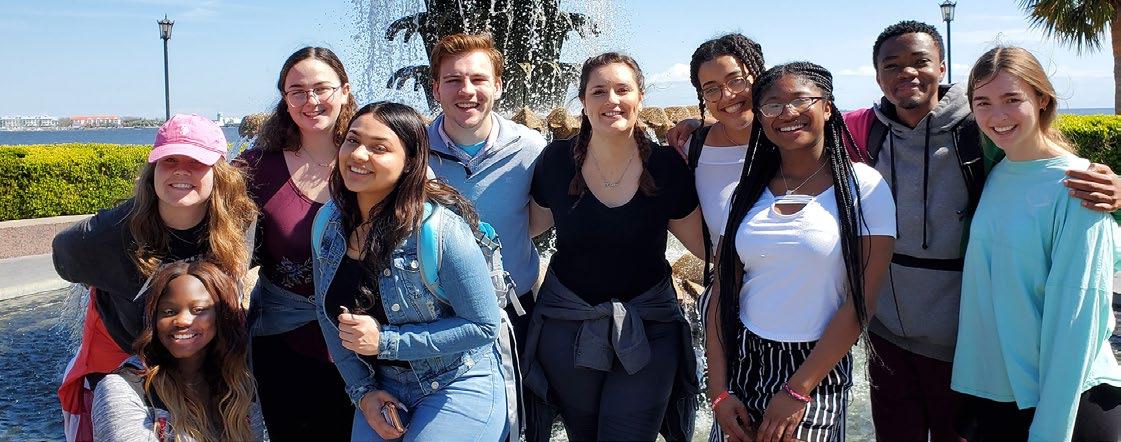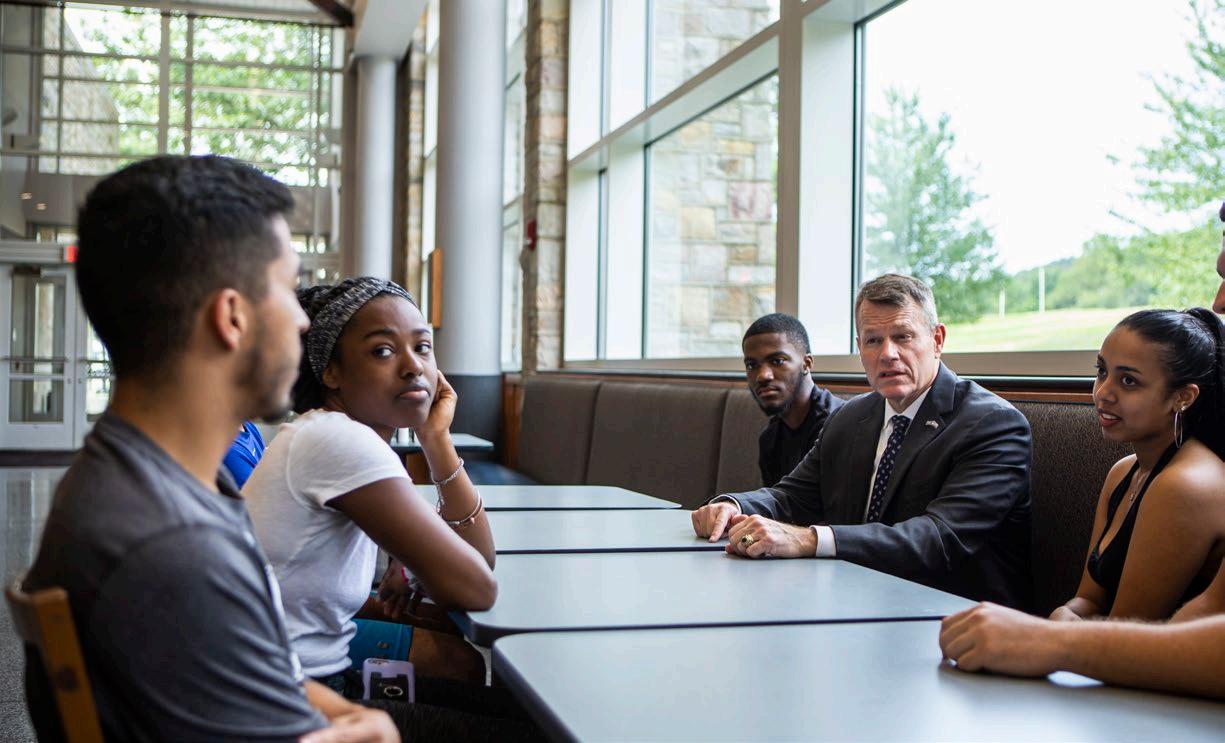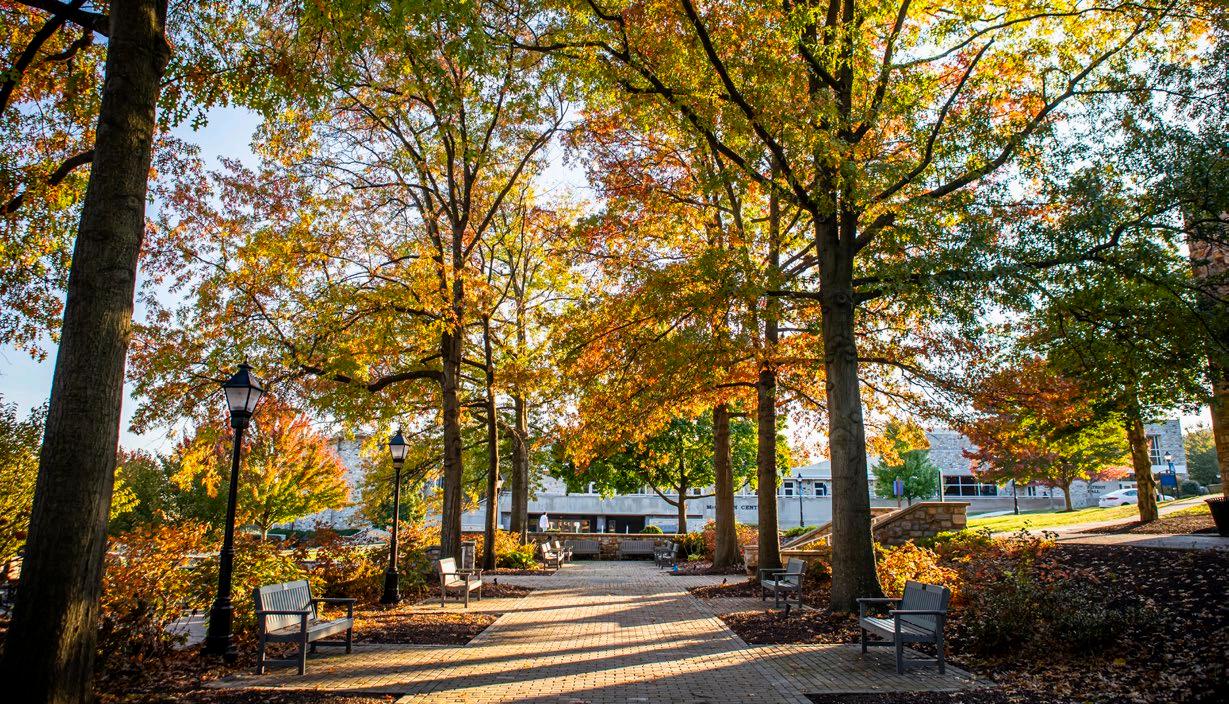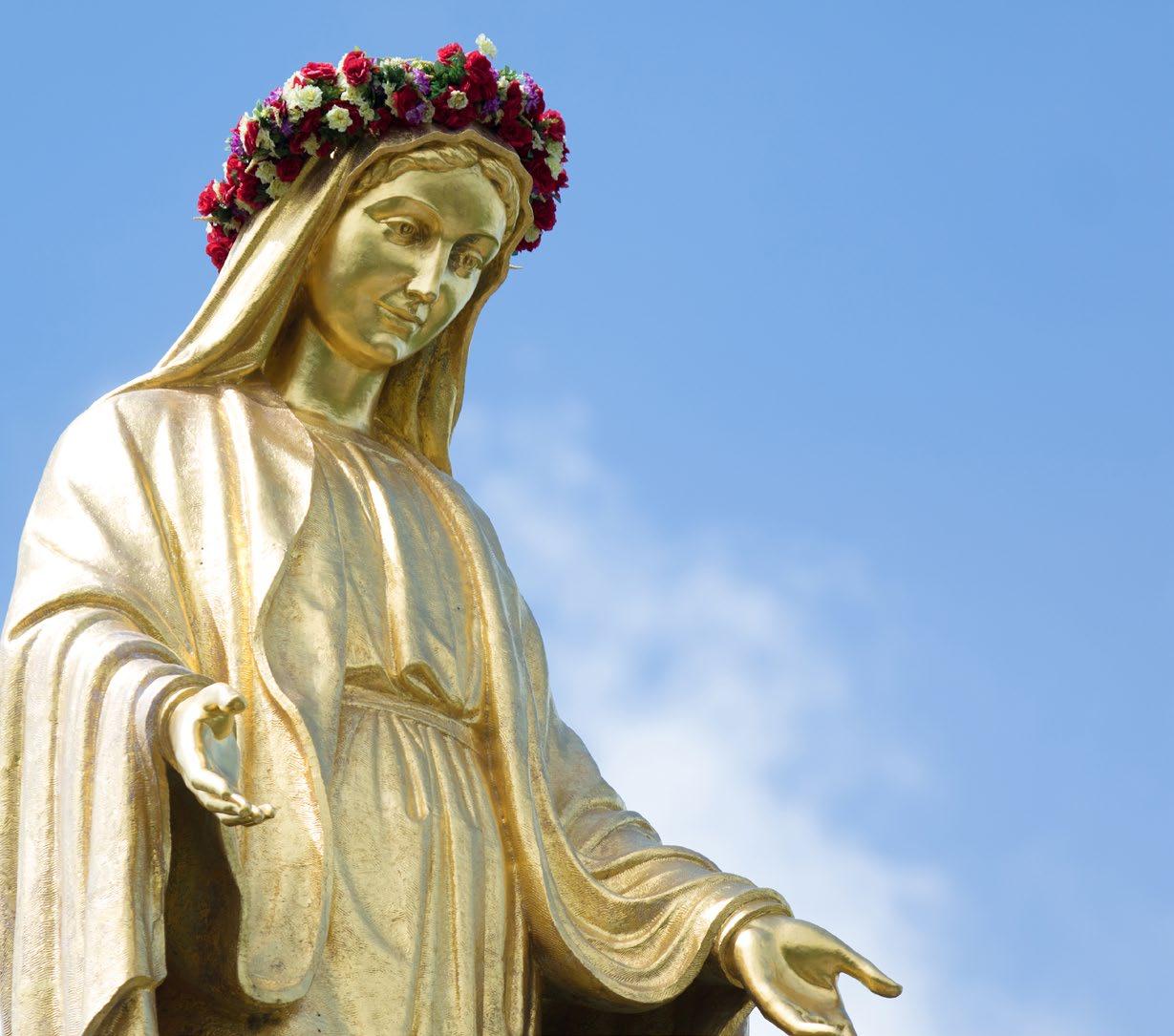
8 minute read
The Constant Process of Change & Reflections on Racial Reconciliation
Students in Charleston, South Carolina, at the first Parker-Dailey Seminar for Racial Reconciliation
By Timothy Fritz, Ph.D., Assistant Professor of History
PEOPLE SAYING THAT HISTORY REPEATS ITSELF IS EXHAUSTING FOR A HISTORIAN, though I often wish it were true. Maybe then, repeated instances of oppression would be clear enough for all of us to act in opposition. Instead, history is far more elusive, altering its cycles just enough to fool those not paying close attention while frustrating others of us convinced we experience the same events repeatedly. As a historian of the Atlantic world who studies the impact of migrations of Native and African people on evolving ideas of American identity, the current state of race relations is troubling, if not unexpected. The study of our shared history, or at least how we remember it, can still offer a path forward for those with a willingness to learn. If there is one thing that history makes clear for us, is that the work of racial reconciliation, at the Mount and our country at large, has never been and never will be an expedient process. Recognition of the task ahead is not a cause for despair, but rather another call to muster in the constant quest for justice.
The situation is always evolving. I teach two different classes on the Civil Rights movement of the 1950s and '60s. My students are quick to realize the myriad ways in which that movement is incomplete. Desegregating schools brought neither equity in, nor equal access to education. Exercising the right to vote without intimidation didn’t end the intimidation by the state often at the center of recent protests. The election of a Black president most certainly didn’t end racism.
The high-profile shootings of African Americans at the hands of police over the past 10 years deeply impact many of our students. Yet, many of us, professors and students alike, feel inadequate when it comes to engaging this community trauma in the classroom. In my observation, much of this unease comes from the realization that many of us remember our history differently. While many of our ancestors were immigrants in one form or another, those experiences differ widely. This realization is often startling and deeply frustrating, but to recognize another’s experience is not to invalidate our own. Instead, the divergence gives us a clear place to start. For example, where many of our grandparents and great grandparents fought in World War I, only Black veterans were lynched in their uniforms upon returning or killed for having the audacity to ask for change for a streetcar fare. The unevenly applied benefits of the G.I. Bill and
racist insurance practices like redlining failed to grant soldiers of all races a piece of the post-war economic prosperity—a sequence of events that hastened civil rights movements of the 20th century. Recognizing these disparate experiences is essential to how we understand our role in this community and should impact how all of us approach an American history that can be painful to many members of our campus family. As a historian, I have the unique opportunity to address these issues not as a commentary on politics, innocence, or guilt, but as an example of different ways we perceive the past and promise of the United States.
Each one of us has unique academic insight, resources, and gifts with which to support the Mount’s broader goal of equipping students to live lives of significance. As President Trainor stated in the wake of a racist hate speech incident last year, “Catholic faith affirms that every human is invaluable and worthy of respect as a member of the human family and that each and every person has inherent dignity and a right to a life consistent with that dignity.” While we may acknowledge that value in principle, reckoning with the past is essential to understanding how that value was compromised across time and space, allowing us to calculate and interpret our actions in the present in pursuit of a stronger human community. Guided by the first two principles of Catholic social teaching, which are the sacred call of life, dignity and the human person, and the social call to participation in strengthening the family and community, all our programming at the Mount can be designed to move students, colleagues and the public toward the deeper understanding of dignity and compassion. This understanding of humanity, however, only purchases our shoes for the march toward justice. The walk itself is much harder.
The work of reconciliation is challenging, but necessary for additional action. It involves the acknowledgement of the painful parts of our past, repentance and forgiveness. Our community can act without it, but it won’t be as effective moving forward together. Meaningful change requires all of our participation. The Mount is beginning to create academic and social spaces to facilitate these difficult conversations in both Emmitsburg and around our nation. The Parker-Dailey Fellowship was established in 2018 after the expressions of hate that took place in Charlottesville, Virginia, earlier that year. In March 2020, I led the first Parker-Dailey Seminar for Racial Reconciliation. The program carries one academic credit and includes a fully funded historical field school lasting seven days over spring break. Just before the acceleration of the global COVID-19 pandemic in this country, I transported 10 students to Charleston, South Carolina, where we rendezvoused with the program’s principal donors Philip and Sally Dailey.
Before the trip, our seminar met four times to discuss our textbook, Denmark Vesey’s Garden, by Blain Roberts and Ethan J. Kytle. The text discusses the construction of historical memory from the moment immediately following the Civil War through the present, with a focus on the discourse between public monuments, racial tensions and broader themes of American identity insofar as Charleston is one of the world’s top tourist destinations. As such, I intended the trip to focus on varying conceptions of history in tension with tourism, but as we got deeper into our discussion among ourselves and the donors, we lingered on the concept of value, which President Trainor put into words a few weeks later. Specifically, we discussed the monetary value of African lives during slavery, the cultural significance in recovering and integrating their stories, the personal value of reconciliation, and finally, the modern monetization of these concepts and experiences. We expressed disparate ideas of value as we lamented some of the darker periods of American history, sparking new interest in restoring our communities in light of these divisions. In an otherwise tumultuous semester, I can think of no better way to have had face-to-face interaction end than this powerful experience. In fact, for those participants in the Class of 2020, this was the end of their time at the Mount.
How are we to keep up? I considered changing my course content after the killing of Ahmaud Arbery in February 2020, only to hear about George Floyd weeks later. There is no keeping up. No quick fix to laws or policies can repair centuries of injustice. We can only look forward. Reconciliation is a process, and restoration is not always achieved, and I think that is okay. Regardless of external stimuli, our sacred duty remains the same. We should consistently strive toward a stronger and smarter campus community that reflects the experiences, passions and concerns of its constituents. CONTINUED...
PART TWO

Reflections on Racial Reconciliation
By Rachel Wheeler, C’22
LAST FEBRUARY, OUR MOUNT COMMUNITY, and especially students of color, were hurt when a student spray painted a racial slur on the bathroom mirror in Pangborn Hall. Around the same time, 10 students, including myself, and trip coordinator Professor Timothy Fritz were gearing up for a spring break trip in Charleston, South Carolina, to study racism and racial reconciliation. An attitude of seriousness loomed over the trip for the events at the Mount in weeks prior—demonstrating that a learning experience like the Parker-Dailey Fellowship was necessary now more than ever.
Charleston looks beautiful, yet underlying all that beauty lingers the memory of slavery, the Jim Crow period and deep-rooted racism. These gruesome human rights abuses are manifest today in tourist-attractions, in wealthy mansions like the Nathaniel Russell House and expansive plantations such as Middletown Place where many enslaved Blacks lived and tourists now come to gawk at decadent dining halls and manicured gardens. We had the opportunity to behold these terrible beauties but observed that within the dining halls sat knife boxes under lock and key to keep the enslaved vulnerable, and surrounding the gardens stood towering fences with barbed wire intended to keep enslaved Blacks in and freedom out. As Mount students, we examined these places and considered our own history. Despite our roots as a Catholic institution, the Mount owned slaves, although few accounts of slaves at the Mount publicly exist outside of the timeline hanging in Upper McGowan announcing the last slaves freed in 1858, and the Washington Post article from 2002, "Be True to Your Ghoul," entertaining the story of a slave named Leander.
Charleston takes great responsibility in preserving the history of slavery through tourism, monuments and museums, but sometimes falls short of historical justice due to prejudice of those who constructed, or destructed, the narrative. We, Mount students, observed first-hand the monuments and memorials to Confederate soldiers, an issue of great interest and concern to our nation today. To me, the most shocking site was the 115-foot statue to John C. Calhoun in Marion Square. Irrespective of politics, it was chilling to see Calhoun, an ardent believer in slavery and white supremacy, on a soaring pedestal. On June 24, 2020, four months following our spring break excursion, the statue of John C. Calhoun was removed from Marion Square, a step toward relief and healing for the entire community.
Like the city of Charleston, the Mount is uniting the community through various initiatives, including mandatory training, curriculum changes and changes to hiring processes, reflecting institutional efforts to better our community by eradicating racism. At the same time, it is the personal responsibility of every student at the Mount to capitalize on opportunities such as the Parker-Dailey Fellowship in order to learn more about a history of oppression made present every day by instances of racism and inequality in our community.










